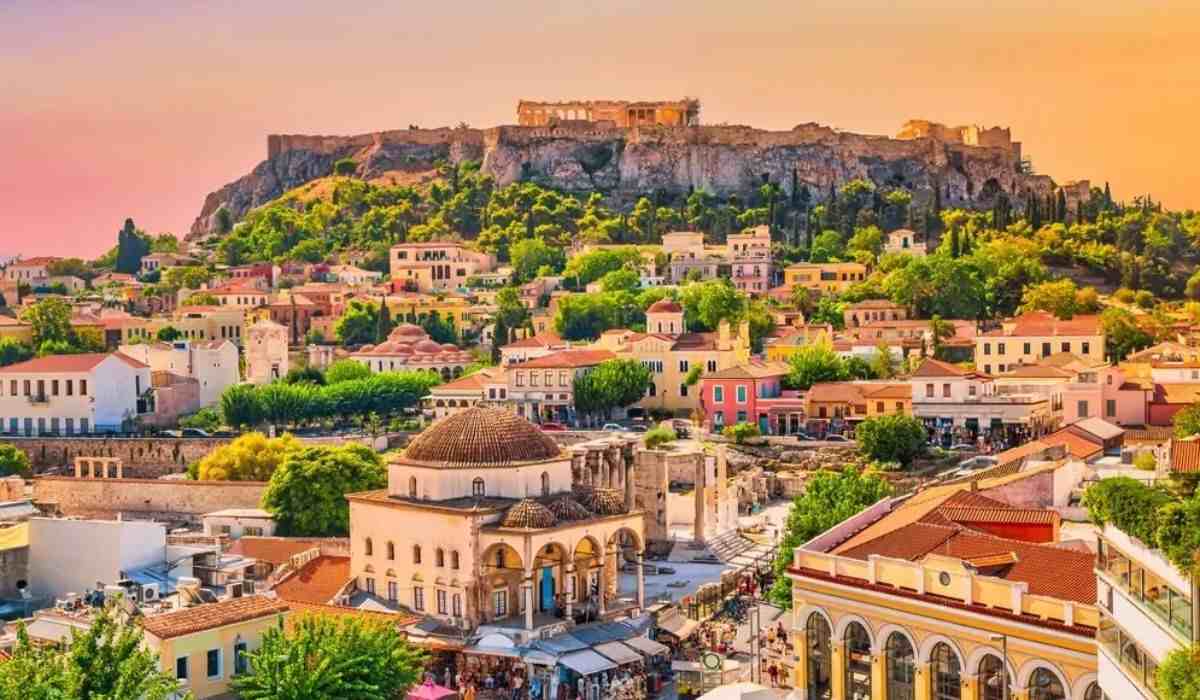Traveling to Greece, a land where ancient wonders mingle with modern delights, beckons American travellers with its irresistible blend of history, culture, and natural beauty.
From the sun-drenched islands scattered across the Aegean Sea to the bustling streets of Athens, Greece offers a journey that’s both timeless and thrilling. Let’s dive into the ultimate guide for U.S. citizens planning their Grecian getaway.
Planning Your Grecian Getaway
Before you start packing your bags, let’s talk strategy. Timing your trip right can make all the difference in your Greek experience.
Best Times to Visit Greece
Greece enjoys a Mediterranean climate: hot, dry summers and mild winters. Here’s a quick rundown:
- Spring (April to mid-June) is ideal for sightseeing. The weather is warm but not scorching, and the tourist crowds haven’t hit their peak.
- Summer (mid-June to August): Peak season. Expect hot weather, crowded attractions, and higher prices. But this is your time if you’re after that quintessential Greek island beach experience.
- Fall (September to October): Another sweet spot. The weather’s still pleasant, the sea’s warm from the summer heat, and the crowds have thinned out.
- Winter (November to March): Cooler and rainier, especially in the north. Many island accommodations shut down, but it’s a great time for budget travelers and those interested in winter sports in the mountains.
Visa Requirements for U.S. Travelers
Good news, fellow Americans! Greece is part of the Schengen Area, which means U.S. citizens can enter for up to 90 days without a visa. Just make sure your passport is valid for at least three months beyond your planned stay.
Pro tip: Starting in 2024, U.S. travelers will need to apply for ETIAS (European Travel Information and Authorization System) before entering Greece. It’s not a visa, but an extra security check that’ll be valid for three years.
Getting There: Flights and Transportation Tips
Most international flights land at Athens International Airport “Eleftherios Venizelos” (AIA). From there, you’ve got options:
- Domestic flights: For island hopping, consider domestic flights. Airlines like Aegean, Olympic Air, and Sky Express offer frequent connections.
- Ferries: For a more leisurely journey, ferries are your best bet. Companies like Blue Star Ferries and Hellenic Seaways offer routes to most islands.
- Trains and buses: The mainland is well-connected by train and bus networks. KTEL runs intercity buses, while TrainOSE operates the rail system.
Table: Average Flight Times from Major U.S. Cities to Athens
| Departure City | Flight Time (approx.) |
| New York | 9-10 hours |
| Los Angeles | 13-14 hours |
| Chicago | 10-11 hours |
| Miami | 11-12 hours |
Must-Visit Destinations in Greece
Now that we’ve got the logistics sorted, let’s explore the heart and soul of Greece. From ancient ruins to pristine beaches, Greece is a treasure trove of experiences.
Athens: Where History Comes Alive
Athens, the cradle of Western civilization, is a city where the past and present dance in harmonious chaos. Start your journey at the city’s crown jewel:
The Acropolis and Parthenon
Perched atop a rocky hill, the Acropolis is Athens’ most iconic landmark. The Parthenon, a temple dedicated to the goddess Athena, stands as a testament to ancient Greek architectural brilliance. As you climb the marble steps, worn smooth by millennia of pilgrims and tourists, you’ll feel the weight of history beneath your feet.
Pro tip: Visit early in the morning or just before closing to avoid the crowds and the midday heat.
Ancient Agora and Temple of Hephaestus
Just a stone’s throw from the Acropolis, the Ancient Agora was once the heart of Athenian public life. Philosophers like Socrates once strolled these grounds, engaging in debates that would shape Western thought. The well-preserved Temple of Hephaestus offers a glimpse into ancient Greek religious practices.
Modern Athens: Plaka and Monastiraki Neighbourhoods
After your journey through ancient times, dive into the vibrant energy of modern Athens. The Plaka neighbourhood, with its narrow, winding streets and neoclassical architecture, feels like a village within the city.
Nearby Monastiraki, famous for its flea market, pulses with life. Here, you can haggle for souvenirs, sample street food, or sip on Greek coffee at a sidewalk café.
Island Hopping Adventures
No trip to Greece is complete without island hopping. Each island has its character, from the party vibes of Mykonos to the rugged beauty of Crete.
Santorini’s Blue-Domed Beauty
Santorini, with its whitewashed buildings and blue-domed churches perched on cliffs overlooking the Aegean, is a postcard that comes to life. Don’t miss:
- Oia sunset: Join the crowds in Oia to witness one of the most spectacular sunsets you’ll ever see.
- Akrotiri archaeological site: Often called the “Minoan Pompeii,” this ancient city was preserved by a volcanic eruption.
- Wine tasting: Santorini’s volcanic soil produces unique, crisp white wines. Try the local Assyrtiko variety.
Mykonos: Party Central and Picturesque Windmills
Mykonos is known for its glamorous nightlife and beautiful beaches. But there’s more to this island than just parties:
- Little Venice: A row of fishing houses with balconies hanging over the sea, now home to charming bars and cafes.
- Windmills: These 16th-century windmills are an iconic symbol of Mykonos.
- Delos: Take a day trip to this nearby island, the birthplace of Apollo and Artemis according to Greek mythology.
Crete: Beaches, Hiking, and Minoan Ruins
Crete, Greece’s largest island, is a world unto itself. From the pink sand beaches of Elafonisi to the rugged Samaria Gorge, Crete offers diverse landscapes and experiences:
- Palace of Knossos: Explore the ancient Minoan civilization at this sprawling Bronze Age archaeological site.
- Samaria Gorge: Hike through one of Europe’s longest canyons.
- Rethymno Old Town: Wander through Venetian and Ottoman architecture in this charming coastal town.
Off-the-Beaten-Path Gems
For travelers looking to venture beyond the typical tourist trail, Greece has plenty of hidden treasures.
Meteora’s Sky-High Monasteries
In central Greece, massive rock formations rise from the plain, topped with centuries-old monasteries. It’s a landscape that seems to defy gravity and reason. Originally, monks accessed these monasteries by removable ladders and nets. Today, you can reach them by steps carved into the rock, but the sense of isolation and serenity remains.
Delphi: Oracle Central and Mountain Vistas
Once considered the center of the world by ancient Greeks, Delphi was home to the famous oracle. Set against the backdrop of Mount Parnassus, the archaeological site includes the Temple of Apollo, the ancient theater, and the stadium. The on-site museum houses treasures including the famous Charioteer of Delphi.
Nafplio: Venetian Charm on the Peloponnese
Often overlooked by international tourists, Nafplio was the first capital of modern Greece. Its old town is a maze of narrow streets, Venetian houses, and hidden squares. Don’t miss the climb up to Palamidi Fortress – all 999 steps of it (or cheat and take a taxi). The view over the town and the Argolic Gulf is worth every step.
Diving into Greek Culture
To truly experience Greece, you need to immerse yourself in its rich culture. From language to etiquette, here’s what you need to know.
Language Basics: Key Phrases to Know
While many Greeks in tourist areas speak English, learning a few Greek phrases can go a long way in showing respect and making connections:
- Yassas (YAH-sas): Hello/Goodbye (formal)
- Efharisto (ef-kha-ri-STOH): Thank you
- Parakalo (para-kah-LOH): Please/You’re welcome
- Pou ine…? (poo EE-neh): Where is…?
- Yamas! (YAH-mas): Cheers!
Etiquette Tips: Dos and Don’ts for American Visitors
Understanding local customs can help you navigate social situations smoothly:
Dos:
- Greet people with a firm handshake
- Dress modestly when visiting churches or monasteries
- Accept offers of food or drink – refusing can be seen as impolite
Don’ts:
- Don’t use the “OK” hand gesture – it’s considered offensive in Greece
- Avoid excessive public displays of affection
- Don’t assume it’s okay to take photos in churches or archaeological sites without permission
Festivals and Events: Timing Your Trip for Maximum Cultural Immersion
Greece’s calendar is packed with festivals and events that offer unique cultural experiences:
- Greek Orthodox Easter: The biggest religious celebration in Greece, usually in April or May
- Athens and Epidaurus Festival: A summer-long celebration of music, theater, and dance
- Apokries: The Greek carnival season, culminating in a big celebration before Lent
- Ohi Day: A national holiday on October 28, commemorating Greece’s refusal to surrender to Axis powers in WWII
Feasting on Greek Cuisine
Greek cuisine is more than just gyros and souvlaki. It’s a celebration of fresh ingredients, simple preparation methods, and centuries-old traditions.
Must-Try Dishes Beyond Gyros and Souvlaki
- Moussaka: Layers of eggplant, minced meat, and béchamel sauce
- Dolmades: Stuffed grape leaves
- Spanakopita: Spinach and feta cheese pie
- Horiatiki: Traditional Greek salad with tomatoes, cucumbers, olives, and a slab of feta
- Octopus: Grilled or marinated, a staple in coastal areas
Wine and Spirits: From Ouzo to Assyrtiko
Greece has been producing wine for over 4,000 years. Some varieties to try:
- Assyrtiko: A crisp white wine, perfect with seafood
- Agiorgitiko: A fruity red wine from the Peloponnese
- Retsina: A traditional white or rosé wine flavored with pine resin
For spirits, don’t miss:
- Ouzo: An anise-flavored aperitif, usually served with mezes (small dishes)
- Tsipouro: A strong grape-based spirit similar to Italian grappa
Food Tours and Cooking Classes for the Culinary Curious
To dive into Greek cuisine, consider:
- Athens Food Tour: Explore the Central Market and sample local delicacies
- Santorini Cooking Class: Learn to make traditional dishes using local ingredients
- Cretan Olive Oil Tasting: Discover the nuances of Greece’s liquid gold
Outdoor Adventures in the Greek Landscape
Greece isn’t just about beaches and ruins. Its diverse landscape offers plenty of opportunities for outdoor enthusiasts.
Hiking Ancient Trails
- Vikos Gorge: In the Pindus Mountains, this is one of the world’s deepest canyons
- Mount Olympus: Climb Greece’s highest peak and walk in the footsteps of the gods
- Menalon Trail: A 75km trail through traditional villages in the Peloponnese
Water Sports and Island Exploration
- Naxos: Excellent windsurfing conditions
- Lefkada: Known for kitesurfing and paragliding
- Zakynthos: Home to the famous Shipwreck Beach, accessible only by boat
Mountain Biking Through Olive Groves
- Pelion Peninsula: Cycle through forested mountains and traditional villages
- Kos: Flat terrain perfect for leisurely rides past ancient ruins and beaches
Practical Tips for American Travelers in Greece
Money Matters: Euros, Cards, and Tipping
- Greece uses the Euro (€)
- Major credit cards are widely accepted, but always carry some cash for small purchases and rural areas
- Tipping is appreciated but not mandatory. 10-15% in restaurants is standard
Staying Connected: SIM Cards and Wi-Fi Availability
- Wi-Fi is widely available in hotels, cafes, and even some public spaces
- For constant connectivity, consider purchasing a local SIM card. Providers like Cosmote, Vodafone, and Wind offer tourist packages
Health and Safety Considerations
- U.S. health insurance may not be valid in Greece. Consider purchasing travel insurance
- Tap water is generally safe to drink in major cities, but stick to bottled water on islands
- Greece is generally very safe, but be aware of pickpockets in tourist areas
Sustainable Tourism in Greece
As travelers, we have a responsibility to protect the places we visit. Here’s how you can travel sustainably in Greece:
Supporting Local Communities
- Stay in family-run guesthouses instead of large chain hotels
- Eat at local tavernas and buy souvenirs from local artisans
- Consider volunteering opportunities, like sea turtle conservation in Zakynthos
Eco-Friendly Accommodations and Activities
- Look for hotels with green certifications like Green Key
- Choose tour operators that prioritize sustainable practices
- Participate in beach clean-ups or eco-tours
Respecting Ancient Sites and Natural Wonders
- Follow all rules at archaeological sites and museums
- Stay on marked trails when hiking
- Never remove artifacts or disturb wildlife
Bringing Greece Home: Souvenirs and Memories
Unique Greek Products to Pack in Your Suitcase
- Olive oil and olives from Kalamata
- Honey from Ikaria
- Mastic products from Chios
- Handwoven textiles from the Cyclades
- Worry beads (komboloi) – a traditional Greek fidget toy
Capturing the Magic: Photography Tips for Stunning Greek Scenes
- Golden hour is your friend, especially for those white-washed buildings
- Use a polarizing filter to enhance the blue of the sea and sky
- Capture local life in markets and village squares for authentic shots
Keeping the Greek Spirit Alive Back in the USA
- Host a Greek-themed dinner party with recipes you learned
- Join a Greek language class or cultural society
- Plan your next trip – there’s always more of Greece to explore!
Frequently Asked Questions
Is Greece expensive to visit?
Greece can be pricey in tourist hotspots, but it’s possible to visit on a budget. Costs vary widely depending on where you go and when.
Is Greece a Schengen visa?
Yes, Greece is part of the Schengen Area. U.S. citizens can enter for up to 90 days without a visa.
Do they speak English in Greece?
Many Greeks in tourist areas speak English, especially younger people. You’ll have no trouble in major cities and popular islands.
How many days do I need in Greece?
Aim for at least 7-10 days to see the highlights. Two weeks is ideal if you want to explore more islands or off-the-beaten-path spots.
What currency is used in Greece?
Greece uses the Euro (€). Credit cards are widely accepted, but it’s smart to carry some cash for small purchases and rural areas.
Conclusion
From the moment you set foot on Greek soil, you’re not just a tourist – you’re a time traveller, a philosopher, an adventurer. The country’s diverse offerings – from sun-soaked beaches to mist-shrouded mountains, from ancient ruins to vibrant modern culture – provide a tapestry of experiences that will leave an indelible mark on your soul.
But perhaps the most transformative aspect of travelling to Greece is the warmth of its people. The concept of “filoxenia” – a friend to strangers – is deeply ingrained in Greek culture. You’ll find yourself welcomed into homes, engaged in passionate discussions, and treated like family by people you’ve just met.

















